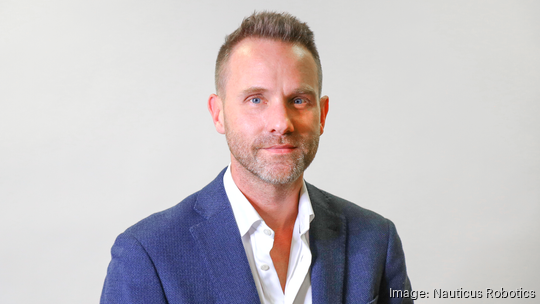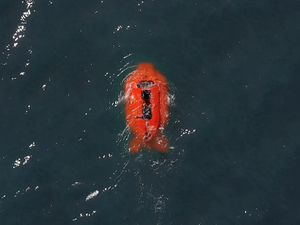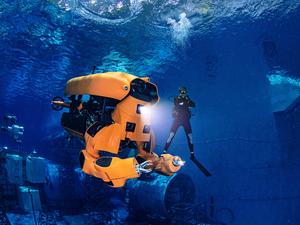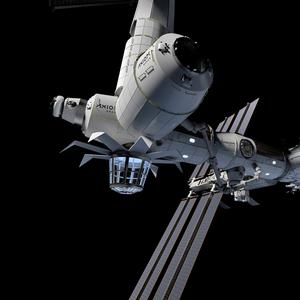
It has been a fast few months for Nicolaus Radford. The CEO of Houston robotics company Nauticus Robotics (Nasdaq: KITT) has seen the business he founded in 2014 go public at the end of 2022 and go global at the beginning of 2023, with its international expansion beginning with offices in Norway and Scotland.
Nauticus Robotics produces subsea robots called Aquanauts, which can change from an autonomous underwater vehicle (AUV) to a remotely operated vehicle (ROV) that can be used for surveying and repairing offshore installations. The Aquanauts are paired with Hydronauts, which Radford described as remotely operated ships.
The company’s global expansion targets work in offshore energy installation, where Radford said he believes the Aquanaut and Hydronaut can provide a revolution in maintenance. The robots will work with clients serving both traditional oil and gas rigs as well as offshore wind infrastructure.
Radford said the company has been planning for a global expansion from its outset due to the nature of its products.
“It'd be wonderful if I could sustain the entire business in the Gulf of Mexico,” Radford said. “But that's just not the case. In order to get the diversity of work that our entire technology solution encompasses, we have to think globally from the get-go.”
Global opportunities also provide Nauticus with the chance to work on offshore infrastructure not always seen in the U.S. While wind power is growing in the U.S., Radford described Europe as the leader in wind power and hinted at possibilities to work on other energy installations such as tidal power fixtures.
“Europe leads when it comes to offshore wind power generation,” Radford said. “And so I fully expect a lot of the advanced techniques that we will develop, beyond where we're at currently, will be directly applicable back as the U.S. offshore wind infrastructure matures.”
In May 2022, the Norwegian government unveiled plans for a major expansion in offshore wind energy by 2040, with some of the planned energy production to be sent to other countries.
“The North Sea is a very critical market for us,” Radford said. “Very high field density of both conventional energy infrastructure and offshore renewables.”
Work in the ocean
Nauticus’ robotic work has been contracted outside of work on energy products. In October, the company landed a multimillion-dollar contract with the U.S. Defense Innovation Unit to develop an amphibious, unmanned unit. In February 2022, the same unit awarded Nauticus a contract to use its ToolKitt software on a prototype Department of Defense ROV.
Radford said robots can be an effective solution for companies that want to reduce their offshore footprint, especially in terms of human workers.
“We think that the new age is going to be intelligent automation, intelligent machines,” Radford said. “There's no reason we shouldn't invest in technologies that reduces the amount of people we deploy in such a harsh environment.”
Nauticus has posted about a “Blue Economy” — the concept of the ocean as the next frontier of employment and innovation — on its website. Radford said that despite his background with NASA, he wanted to see more investment in the ocean.
“I get rather frustrated on so much attention that's paid to space with such lofty, far-out goals. Like, I want to put people on Mars, too,” Radford said. “We saw this ocean issue right now, and we pour money into it. Today, the ocean gets a fraction of the investment that space does.”
The international expansion, which Radford said includes a third location awaiting clearance, is Nauticus’ first big move since the company went public through a SPAC merger in September 2022. Nauticus merged with New York-based CleanTech Acquisition Corp., a special purpose acquisition company looking for deals in clean energy and climate tech, in a deal valued at $561 million.
A team of ex-NASA engineers founded Nauticus as Houston Mechatronics in 2014. The company develops subsea robots and works with government and commercial clients through a robotics-as-a-service model. Radford previously led spaceflight and defense robotics engineering efforts while working at NASA's Johnson Space Center.







